International Strategy for Higher Education Institutions
International Strategy for Higher Education Institutions
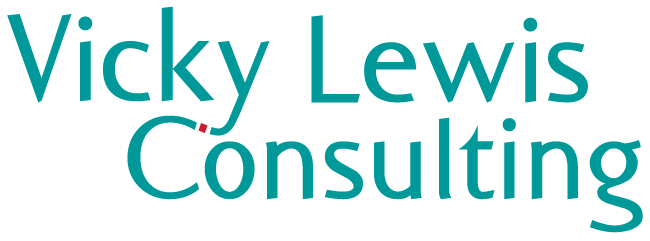
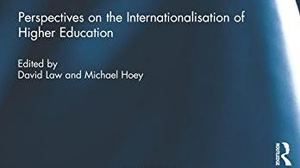
Alongside my consultancy, I do academic research, present at conferences and write articles and opinion pieces. My consultancy often sparks ideas for research projects; and my research feeds into my consultancy work, ensuring it’s informed by the latest thinking.
This page provides access to resources I’ve developed and publications I’ve produced, which are relevant to those with an interest in higher education internationalisation and, in particular, those developing international strategies and related plans.
The links in the list below (the topics I write and speak about most) will take you to a selection of resources and publications relevant to each topic.
When new material is added, this will be flagged up via Twitter, LinkedIn and on the Vicky Lewis Consulting blog.
International strategy creation and review
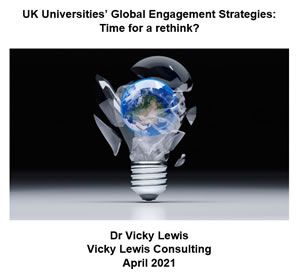 What makes for a strong, distinctive institutional international strategy? How do priorities vary (across the sector and even within institutions)? How can a university ensure its strategy is the right balance of ambitious and realistic? What does success look like and how can it be measured? What are the ingredients for high stakeholder engagement and effective delivery?
What makes for a strong, distinctive institutional international strategy? How do priorities vary (across the sector and even within institutions)? How can a university ensure its strategy is the right balance of ambitious and realistic? What does success look like and how can it be measured? What are the ingredients for high stakeholder engagement and effective delivery?
These are all questions that I enjoy exploring.
During 2020-2021, I undertook a research project which resulted in the sector report, UK Universities Global Engagement Strategies: Time for a Rethink?, showcased on (and downloadable from) a dedicated page of my website.
A useful resource derived from this is a suite of questions for institutional leaders to ask (of themselves and others) during the consultation phase of new international strategy development – or when the strategy is being reviewed. These questions (pdf) can be used to spark valuable discussions and lead to the creation of a distinctive strategy with strong stakeholder buy-in.
Another resource (an output of my DBA) is an exercise – the (pdf) Internationalisation Rationale Prioritisation Exercise (or IRPE) – which can be used by institutions to stimulate debate and aid development of an internationalisation strategy. Ideally it should be introduced at the outset to clarify rationales for engagement and, in particular, any gaps between aspirations and reality which might help to inform the way forward.
If you're embarking on strategy development, there are various approaches you can used to clarify your thinking. A useful place to start is the resources section of the Goal Atlas website. Hunter and Sparnon also provide some great tips on strategic planning (with particular reference to higher education institutions).
**
During 2022, I started investigating what an ethical international strategy might look like, with ideas shared in a series of blogs on my own website (this final one includes links to the earlier ones).
If you're interested in some background reading on the characteristics of (and themes within) UK strategies for international engagement, here's a selection of thought pieces which draw on my Global Strategies research:
Lewis, V., 2022. HEI global engagement: from ‘blah, blah, blah’ to concrete measures. Spotlight. ACEEU.
Lewis, V., 2021. Fresh Perspectives and Inclusive Models (pdf). Forum, Winter 2021 (Internationalisation for All: Distributed Leadership in International Education), pp.6-8. EAIE.
Lewis, V., 2021. Language learning is at the heart of internationalisation. Times Higher Education (4 July 2021).
Lewis, V., 2021. For real impact, universities should shake up their global engagement strategies. Wonkhe (3 June 2021).
Lewis, V., 2021. A good time to rethink global engagement strategies? University World News (15 May 2021).
Lewis, V., 2021. What’s on the menu for post-pandemic international strategies? Higher Education Policy Institute (12 May 2021).
Lewis, V., 2021. Rethinking university strategies for global engagement: insights from the UK. The PIE Blog (5 May 2021).
Transnational education and international partnerships
 This is a field I was drawn into following a consultancy project to enhance the positioning and marketing of an international branch campus. It led to an academic research project on international campus marketing, which also explored the prerequisites for a strong relationship between the home and international campuses of an institution.
This is a field I was drawn into following a consultancy project to enhance the positioning and marketing of an international branch campus. It led to an academic research project on international campus marketing, which also explored the prerequisites for a strong relationship between the home and international campuses of an institution.
Drawing on both research and consultancy experience, I created an (pdf) Information Sheet that highlights the points in the overseas campus development process (from Strategy Development, through Resource Allocation, to Implementation) when marketing plays a critical role. This document also lists some questions that HE institutions should ask themselves at each stage.
For a more in-depth analysis, see my (pdf) article Embedding marketing in international campus development: Lessons from UK universities, which appeared in July 2015 in the Taylor and Francis journal Perspectives: Policy and Practice in Higher Education. It also features as a chapter in the 2017 book: Perspectives on the Internationalisation of Higher Education. Another output from this project was a chapter on Collaborating Across Organisational Cultures: Lessons from a Study of International Branch Campuses in the 2018 book Exporting Transnational Education: Institutional Practice, Policy and National Goals (eds. Tsiligiris, V. and Lawton, W.), pp.89-108. Palgrave.
The Summer 2014 edition of Forum magazine (a quarterly publication of the European Association for International Education - EAIE) also includes an article I wrote, entitled: Branch Campus Development: Marketing expertise required (pdf).
Other TNE-related investigations included one on International Education Hubs, shared in a series of blogs (this final one includes links to the earlier ones); and a piece which explored changes in UK institutional strategies for TNE, preferred delivery modes and governing body engagement (here’s the final blog in that series).
Values-based internationalism and social responsibility
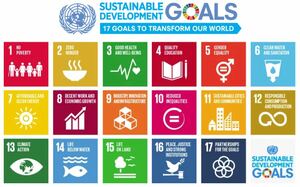 When working on my doctorate, I came up with the notion of ‘integrated internationalism’, defined as ‘the demonstration of an ethos of international and intercultural cooperation and understanding through all of an institution’s policies, functions and the actions of its members’.
When working on my doctorate, I came up with the notion of ‘integrated internationalism’, defined as ‘the demonstration of an ethos of international and intercultural cooperation and understanding through all of an institution’s policies, functions and the actions of its members’.
My 2007 thesis, 'Integrated internationalism' in UK higher education: interpretations, manifestations and recommendations, explores institutional rationales for internationalisation across the UK higher education sector at that time (survey conducted in 2005), then delves into rhetoric, strategy and practice at three very different case study institutions.
Here's a (pdf) slide deck covering key findings (part of a session at the 2008 EAIE conference):
Lewis, V., 2008, Leading a Higher Education Institution towards 'integrated internationalism': perceptions and practice from the UK. European Association for International Education (Antwerp, Belgium)
Earlier thinking on this is shared in the two (pdf) conference papers below:
Lewis, V. Integrated internationalism: interpretation and implementation in UK HE. Education for Sustainable Development: Graduates as Global Citizens Conference, Bournemouth 12-13 September, 2005.
Lewis, V. & Luker, P. The meaning of internationalisation for a modern vocational institution: a study of Bournemouth University, UK. Going Global: The UK International Education Conference (British Council), Edinburgh 8-10 December, 2004.
More recently, I’ve explored:
Fakunle, O., Kalinga, C. and Lewis, V., 2022. Internationalization and Decolonization in UK Higher Education: Are We There Yet? International Higher Education, Issue No. 110, pp.25-27. Boston, US.
(You'll need to scroll to Issue No. 110.)
International marketing and student recruitment
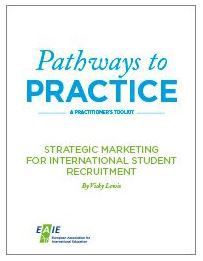 Within the UK context, international student recruitment is central to the strategies of many universities – for important social and cultural reasons, but also because the associated fee income cross-subsidises research and makes the difference between some programmes being viable or not.
Within the UK context, international student recruitment is central to the strategies of many universities – for important social and cultural reasons, but also because the associated fee income cross-subsidises research and makes the difference between some programmes being viable or not.
For those institutions starting from a lower international enrolments base, I drew up a step-by-step process for developing an international marketing and student recruitment plan shared in this (pdf) Information Sheet. I was asked to expand this (and make it suitable for use by non-UK institutions) by the EAIE, who published a version of it in 2016, entitled Strategic marketing for international student recruitment, in their Pathways to Practice series.
We have known for many years that a key motivator for international study is the enhancement of career prospects. However, it is only relatively recently that universities have started to pay attention to the employability needs (and job destinations) of international students. Boosting support in this area and sharing positive outcomes can have a direct impact on the institutional (and programme) choices of prospective students.
I explore this in a co-authored piece in the Summer 2020 edition of the EAIE’s Forum magazine:
Lewis, V. and Nicol, L., 2020. What Happens After Graduation? (pdf download), Forum, Summer 2020 (Employability for the 21st Century), pp.6-8. EAIE
This draws on some observations made in an earlier blog on international graduate employability.
International student recruitment patterns are affected by volatility in the global landscape. Just before Covid-19 had spread to Europe, I reflected on this in a blog for Halpin.
One of my own blogs – No going back (in a good way) – touches on the pandemic-related changes in international recruitment practice that individuals and institutions should hold on to.
Another hot topic since before the pandemic has been international market diversification, which was the subject of a webinar I chaired in early 2022, outlined (and linked to) in this blog.
Institutional infrastructure and stakeholder engagement
 A topic that I’ve explored (through consultancy assignments and training workshops) relates to prerequisites for internationalisation success. These include having the right infrastructure and resourcing, engaged colleagues, and an internationalist mindset.
A topic that I’ve explored (through consultancy assignments and training workshops) relates to prerequisites for internationalisation success. These include having the right infrastructure and resourcing, engaged colleagues, and an internationalist mindset.
From 2014 to 2016, I co-delivered a full-day workshop ahead of the annual EAIE conference on ‘building internal support for internationalisation’, which is briefly described in this blog. I also explored the professionalisation of the International Officer role in this (pdf) article for the EAIE:
Lewis, V., 2016. A journey through time and space: the shifting profile of the modern International Officer. Forum, Winter 2016 (The New International Officer), pp.36-38. EAIE
In March 2019, I reflected on 25 years in international higher education. What’s changed? in a blog for Halpin. I also considered in my own blog (in August 2020) ‘the changing face of the international office’ from the turn of the century to the 2020s.
Mid-lockdown reflections on the ‘travelling mindset’ and the relevance of this to Internationalisation at Home are shared in this May 2020 blog.
The changing face of higher education internationalisation

Internationalisation of higher education (at global, national and institutional level) is a topic that has fascinated me throughout my career, particularly since I started doing research in this area for my DBA back in the mid-2000s.
Reflections on changes over time and discussion of emerging priorities feature in my 2023 podcast interview with Professor Chris Hill and Professor Judith Lamie and in my 2020 video interview with Professor Elspeth Jones.
Recent articles touching on different aspects of higher education internationalisation, with a focus on the UK context, include:
Ilieva, J. and Lewis, V., 2023. Walking the line: the UK and China (pdf). Forum, Spring 2023 (Risk and Response), pp.35-37. EAIE.
Lewis, V., 2022. UK higher education: Time for an international rebrand? EAIE blog (18 October 2022).
Earlier thinking is shared in a blog for Halpin: Reinventing international higher education (May 2020).
Further observations feature in blogs on my own website: on different drivers for internationalisation (May 2019), on ‘ditching the dichotomies in international HE’ (May 2020), and on continuity and change (June 2020).
Personal reflections on international HE and consultancy

As someone who has spent nearly three decades working in international higher education and has made the transition from working within HE institutions to working for myself, I occasionally use my blog to share more personal, career-related reflections.
Recent pieces include reviews of 2021 and 2022 and observations on why international education is important to me, sparked off by an interview for The PIE Review.